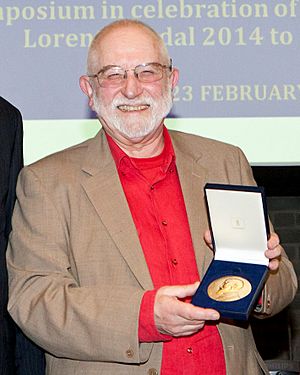Michael Berry (physicist) facts for kids
Quick facts for kids
Sir
Michael Berry
|
|
|---|---|

Berry in 2015
|
|
| Born |
Michael Victor Berry
14 March 1941 |
| Alma mater | University of Exeter (BSc) University of St. Andrews (PhD) |
| Known for |
|
| Awards | Maxwell Medal and Prize (1978) Fellow of the Royal Society (1982) Lilienfeld Prize (1990) Royal Medal (1990) IOP Dirac Medal (1990) Naylor Prize and Lectureship (1992) ICTP Dirac Medal (1996) Knight Bachelor (1996) Wolf Prize (1998) Ig Nobel prize (2000) Onsager Medal (2001) Pólya Prize (2005) Lorentz Medal (2014) |
| Scientific career | |
| Institutions | University of Bristol |
| Thesis | The diffraction of light by ultrasound (1965) |
| Doctoral advisor | Robert Balson Dingle |
| Doctoral students | |
Sir Michael Victor Berry, born on March 14, 1941, is a famous British scientist. He is a theoretical physicist, which means he uses math and ideas to understand how the universe works. He used to be a professor at the University of Bristol.
Professor Berry is best known for discovering something called the Berry phase. This is a special effect seen in both quantum mechanics (the physics of tiny particles) and optics (the study of light). He also works on semiclassical physics, which connects the rules of quantum mechanics with the rules of everyday physics. He applies his ideas to things like quantum chaos and how waves behave.
Contents
Early Life and Education
Michael Berry grew up in a Jewish family. His father was a taxi driver in London, and his mother was a dressmaker.
He studied physics at the University of Exeter, earning his first degree in 1962. Later, he went to the University of St. Andrews and completed his PhD in 1965. His PhD research was about how light bends when it passes through sound waves.
Career at Bristol University
Sir Michael Berry spent his entire career at the University of Bristol. He started as a research fellow in 1965. Over the years, he became a lecturer, then a reader, and finally a Professor of Physics. From 1988 to 2006, he was a Royal Society Research Professor. Since 2006, he has been an Emeritus Professor, meaning he is retired but still connected to the university.
Awards and Special Recognitions
Sir Michael Berry has received many important awards and honors for his work. He was made a Fellow of the Royal Society in 1982. This is a very high honor for scientists in the UK. In 1996, he was knighted, which is why he is called "Sir."
From 2006 to 2012, he was the editor of a science journal called Proceedings of the Royal Society A.
Here are some of the awards he has received:
- Maxwell Medal and Prize (1978)
- Elected Fellow of the Royal Society (1982)
- Elected Fellow of the Royal Society of Arts (1983)
- Dirac Medal (1990)
- Lilienfeld Prize (1990)
- Royal Medal (1990)
- Naylor Prize and Lectureship (1992)
- Dirac Medal (1996)
- Wolf Prize for Physics (1998), shared with Yakir Aharonov
- Ig Nobel Prize for Physics (2000), shared with Andre Geim. They won for their work on using magnets to make a frog float! This research later helped inspire a lunar gravity research facility in China.
- Onsager Medal (2001)
- Pólya Prize (2005)
- Lorentz Medal (2014)
See also
- S. Pancharatnam
- Gordon decomposition
- Hilbert–Pólya conjecture
- Riemann hypothesis
- Spin-stabilized magnetic levitation
- Superoscillation

